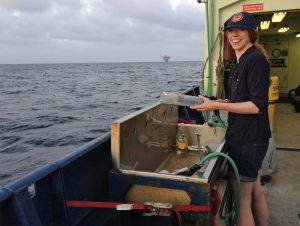Study Describes Functional Diversity of Oil-Degrading Microbes in Coral and Sediment
– June 9, 2015
Scientists from Haverford College examined Gulf of Mexico sediment and flocculent material (floc) associated with oil-impacted corals to study indigenous microbial communities and their oil degradation potential.
They found high bacteria and archaea abundance and diversity in sediment and floc; over half of the bacteria present were oil-degrading Proteobacteria. Sediment contained greater abundance and diversity of oil-degrading anaerobic bacteria than did floc where aerobic processes dominated. The researchers published their findings in the January 2015 Deep-Sea Research II: Topical Studies in Oceanography: Examining the diversity of microbes in a deep-sea coral community impacted by the Deepwater Horizon oil spill.
Previous research indicated that oil and dispersant compounds persisted in the water column after the Deepwater Horizon spill. Subsurface plumes containing hydrocarbons initially exhibited an enrichment of oil-degrading microbes that were also found in sediment near the wellhead. Coral in the vicinity showed evidence of damage and the presence of oil and dispersants from the spill. This study provides insights into microbial community structure and gene diversity involved in deep-sea oil degradation.
In December 2010, researchers collected sediment and floc samples from damaged coral at 1,370 meters depth, 11 kilometers southwest of the blowout site. They extracted and sequenced microbial DNA and analyzed select bacteria and archaea genes. Authors quantified alkB (gene involved in aerobic degradation of n-alkanes) and assA/assB (gene involved in anaerobic degradation of n-alkanes and polycyclic aromatic hydrocarbons) to determine comparative aerobic and anaerobic activity. They found that alkB was present in both sediment and floc samples, but assA/assB only occurred in sediment samples.
Helen White, one of the study’s authors, discussed their results, “The presence of oil-degrading genes indicated that some of these microbes can degrade oil. Interestingly, the most abundant microbes in the coral and sediment were similar to those examined in other Deepwater Horizon-impacted samples, including the subsurface plume and deep-sea sediments.” She continued, “Because the pre-spill microbial community associated with these deep-sea corals is not known, it is impossible to determine how much the Deepwater Horizon spill has perturbed the community. However, this study provides important baseline data to which future studies examining the health and recovery of these deep-sea communities can be compared.”
The study authors are R.L. Simister, E.W. Antzis, and H.K. White.
************
This research was made possible in part by a grant from the Gulf of Mexico Research Initiative (GoMRI) to the Haverford College Department of Chemistry for their project Weathering of Petroleum and Dispersant Components in the Aftermath of the Deepwater Horizon Oil Spill. Other funding support included a National Science Foundation RAPID grant (OCE-1045131).
The Gulf of Mexico Research Initiative (GoMRI) is a 10-year independent research program established to study the effect, and the potential associated impact, of hydrocarbon releases on the environment and public health, as well as to develop improved spill mitigation, oil detection, characterization and remediation technologies. An independent and academic 20-member Research Board makes the funding and research direction decisions to ensure the intellectual quality, effectiveness and academic independence of the GoMRI research. All research data, findings and publications will be made publicly available. The program was established through a $500 million financial commitment from BP. For more information, visit https://gulfresearchinitiative.org/.
© Copyright 2010- 2017 Gulf of Mexico Research Initiative (GoMRI) – All Rights Reserved. Redistribution is encouraged with acknowledgement to the Gulf of Mexico Research Initiative (GoMRI). Please credit images and/or videos as done in each article. Questions? Contact web-content editor Nilde “Maggie” Dannreuther, Northern Gulf Institute, Mississippi State University (maggied@ngi.msstate.edu).






